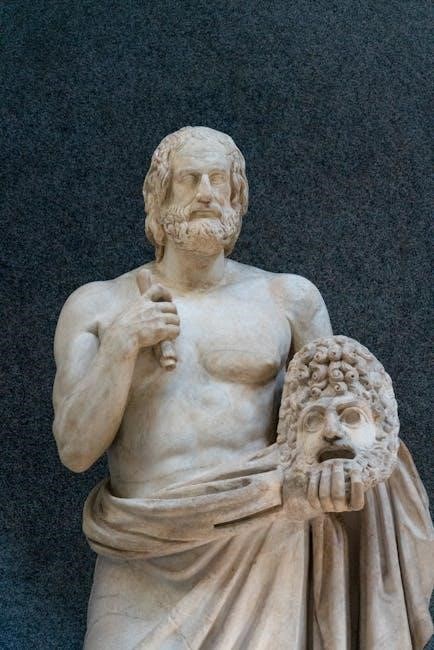Euripides’ Medea is a timeless Greek tragedy exploring themes of revenge, betrayal, and gender roles, offering profound psychological insights into its protagonist’s motivations and conflicts.
1.1 Historical Context and Premiere
Euripides’ Medea premiered in 431 BCE at the Dionysia festival in Athens, where it placed third. This tragedy reflects the cultural and political climate of 5th-century Athens, blending myth with psychological depth. Euripides’ innovative storytelling and complex characters set a new standard for Greek tragedy, making Medea a landmark work in classical theater.
1.2 The Mythological Background of Medea
Medea, a sorceress and daughter of King Aeetes, helped Jason secure the Golden Fleece. Betrayed by Jason, she exacts revenge, showcasing her magical prowess and emotional turmoil. Euripides’ adaptation delves into her mythological roots, transforming her into a tragic figure whose actions blur the line between heroism and monstrosity, captivating audiences with her complexity and depth.
Main Characters in Medea
Medea, the sorceress; Jason, her betrayed husband; Creon, the Corinthian king; and the Chorus of Corinthian women drive the tragic narrative, exploring themes of betrayal and revenge.
2.1 Medea: The Tragic Heroine
Medea, a sorceress and former princess, is the complex protagonist whose tragic downfall stems from betrayal and revenge. As a wife and mother, her emotional depth and intellectual prowess drive her actions, showcasing her as both a victim of circumstance and a mastermind of retribution. Her tragic fate highlights the devastating consequences of unchecked passion and societal constraints on women.
2.2 Jason: The Betrayer
Jason, the leader of the Argonauts, is portrayed as a self-serving betrayer who abandons Medea for political gain. His decision to marry Creon’s daughter in Corinth ignites Medea’s wrath, revealing his lack of loyalty and moral integrity. Jason’s betrayal not only destroys his family but also underscores the societal norms that justify male ambition over female devotion and honor.
2.3 Creon and the Royal Family of Corinth
Creon, the King of Corinth, seeks to secure his dynasty by marrying his daughter to Jason, fearing Medea’s influence. His decree to banish Medea and her children intensifies the conflict. Creon’s actions reflect the patriarchal norms of ancient Greece, prioritizing political alliances over personal relationships, and highlighting the royal family’s role in perpetuating societal hierarchies and power struggles.
2.4 The Chorus: Corinthian Women
The chorus, composed of Corinthian women, serves as emotional and narrative witnesses, providing context and reflecting societal norms. Their empathy for Medea underscores gender dynamics, while their inability to intervene highlights the tragedy’s inevitability. Through their odes, they convey moral reflections and emotional depth, bridging the audience’s connection to Medea’s suffering and the play’s central themes of betrayal and justice.
Central Themes in Euripides’ Medea
Euripides’ Medea explores themes of revenge, gender roles, and justice, delving into the complexities of human nature and societal expectations, with Medea’s struggle embodying a tragic clash of emotions and moral dilemmas.
3.1 Revenge and Retribution
In Euripides’ Medea, revenge is a central theme, driven by Medea’s betrayal by Jason. Her quest for retribution is both personal and symbolic, fueled by a deep sense of injustice. The chorus underscores her emotional turmoil, while her actions lead to tragic consequences, highlighting the destructive power of unchecked vengeance. This theme remains a pivotal exploration of human conflict and moral ambiguity.
3.2 Gender Roles and Patriarchy
Euripides’ Medea critiques patriarchal norms, portraying Medea as a woman defying societal expectations. The chorus of Corinthian women highlights her isolation and the gendered constraints she challenges. Medea’s actions, though extreme, underscore the marginalization of women in ancient Greek society, making her a powerful symbol of resistance against patriarchal oppression. The play remains a potent exploration of gender inequality and female agency.
3.3 Justice, Morality, and Tragedy
Euripides’ Medea explores complex themes of justice, morality, and tragedy, highlighting the moral ambiguity of Medea’s revenge. Her actions challenge societal norms, raising questions about the ethics of retribution and the consequences of unchecked passion. The play’s tragic outcome underscores the devastating cost of pursuing justice through vengeance, leaving the audience to grapple with the moral implications of Medea’s decisions.

The Role of the Chorus in Medea
The Chorus in Medea serves as an emotional and narrative guide, reflecting the audience’s feelings while offering context and moral commentary without influencing the plot directly;
4.1 Function of the Chorus in the Play
The chorus in Medea functions as a narrative voice, providing exposition, commentary, and emotional depth. They offer insights into the characters’ motivations and the moral dilemmas, while their songs and dialogues bridge scenes, maintaining dramatic continuity. The chorus of Corinthian women empathizes with Medea, yet remains neutral, underscoring the tragedy’s universal themes and enhancing its emotional impact.
4.2 Emotional and Narrative Impact
The chorus in Medea amplifies the emotional tension, deepening the audience’s connection to the characters. Their chants and laments highlight Medea’s anguish, Jason’s betrayal, and the tragic consequences, creating a haunting atmosphere. Narratively, the chorus foreshadows events and reflects on the moral implications, enriching the play’s complexity and emotional resonance while maintaining its dramatic pacing and thematic coherence.

Modern Adaptations and Interpretations
Contemporary productions reimagined Medea with diverse perspectives, such as stage adaptations in London and Black re-envisionings, offering fresh insights into betrayal, revenge, and its timeless themes.
5.1 Stage Productions and Reimaginations
Modern stage productions of Medea offer fresh perspectives, such as Dominic Cooke’s adaptation at Soho Place Theatre, starring Sophie Okonedo, and a Black reimagining at the University of Colorado. These interpretations highlight themes of betrayal and revenge, blending ancient narratives with contemporary contexts to captivate diverse audiences and explore the timeless complexity of Medea’s character and story.
5.2 Medea in Opera and Film
Medea has inspired numerous operas, such as Cherubini’s masterpiece, and film adaptations, which reinterpret Euripides’ tragic heroine. These works maintain the core themes of revenge and betrayal while incorporating modern artistic elements, ensuring Medea’s story remains relevant across different mediums and cultural contexts, continuing to captivate audiences with its enduring emotional and narrative power.

Psychological and Philosophical Insights
Euripides’ Medea offers profound psychological and philosophical insights, exploring the heroine’s internal conflict, emotional complexity, and the tragic consequences of her actions, questioning justice and morality, culminating in the tragedy of motherhood.
6.1 Medea’s Motivations and Conflict
Medea’s motivations stem from a deep sense of betrayal by Jason, her husband, who abandoned her for another woman. Her conflict arises from a desire for revenge, driven by a mix of emotional pain, pride, and a need to restore her honor. Euripides masterfully portrays her internal struggle between love, anger, and maternal instinct, leading to tragic consequences, making her one of the most complex characters in Greek tragedy.
6.2 The Tragedy of Motherhood
Medea’s role as a mother is central to the tragedy, as her love for her children conflicts with her desire for revenge. Euripides highlights the devastating consequences of her choice to kill her sons, exploring the emotional and moral complexities of motherhood intertwined with betrayal and sacrifice, making her actions both horrifying and heart-wrenching.
Comparative Analysis with Other Works
Euripides’ Medea is often compared to Seneca’s version, highlighting differences in tone and characterization. Modern adaptations further explore the myth’s cultural and psychological dimensions, offering fresh perspectives on its enduring themes.
7.1 Medea by Seneca
Seneca’s Medea amplifies the intensity of Euripides’ original, with a darker tone and heightened emotional depth. Seneca portrays Medea as a more ruthless figure, emphasizing her magical powers and relentless vengeance. Jason is depicted as weaker and more culpable, intensifying the moral conflict. The play’s focus on extreme emotions and dramatic spectacle influenced later European adaptations, shaping the character’s enduring legacy in Western literature.
7.2 Modern Retellings and Cultural Relevance
Modern adaptations of Medea reinterpret the tragedy through diverse perspectives, such as racial and feminist lenses, resonating with contemporary issues like patriarchy and identity. Productions like Dominic Cooke’s version in London highlight Medea’s relevance today, offering fresh insights into her struggle and enduring appeal across cultures and generations, ensuring the story’s continued impact on global audiences.

Where to Find Medea by Euripides in PDF
Medea by Euripides is available in PDF format on academic databases like JSTOR and online archives such as the Diotima anthology and Perseus Digital Library.
8.1 Online Resources and Academic Databases
Euripides’ Medea in PDF can be found on academic platforms like JSTOR, Perseus Digital Library, and Google Scholar. These databases offer free and paid access to translated scripts, critical analyses, and scholarly articles. Additionally, websites such as Stoa.org and Diotima.anthology provide downloadable versions, including translations by E.P. Coleridge and revised editions by Gregory Nagy. These resources cater to both researchers and general readers interested in classical Greek tragedy.
8.2 Translations and Editions
Medea by Euripides is available in various translations, including those by E.P. Coleridge, Roger Ceragioli, and Gregory Nagy. Modern editions often include annotations and introductions, enhancing readability for contemporary audiences. Translations are accessible in PDF format through academic databases, ensuring the play’s timeless themes remain accessible to scholars and readers worldwide, bridging ancient Greek tragedy with modern interpretation.

Euripides’ Medea remains a powerful exploration of revenge, betrayal, and human nature, its themes enduring across centuries. PDF versions of the play are widely available for study and reflection.
9.1 The Enduring Legacy of Medea
Euripides’ Medea has left an indelible mark on literature and theater, influencing countless adaptations and interpretations. Its exploration of revenge, gender, and morality continues to resonate, making it a cornerstone of classical tragedy. The play’s psychological depth and cultural relevance ensure its enduring appeal, as seen in modern productions and scholarly discussions, solidifying its place in the canon of world literature.
9.2 Relevance in Contemporary Discussions
Euripides’ Medea remains a focal point in modern discourse, particularly in feminist and cultural studies. Its themes of gender inequality, betrayal, and revenge resonate in discussions about power dynamics and personal autonomy. The play’s exploration of morality and justice aligns with contemporary debates on ethics and societal norms, ensuring its relevance in addressing universal human struggles and societal challenges today.
